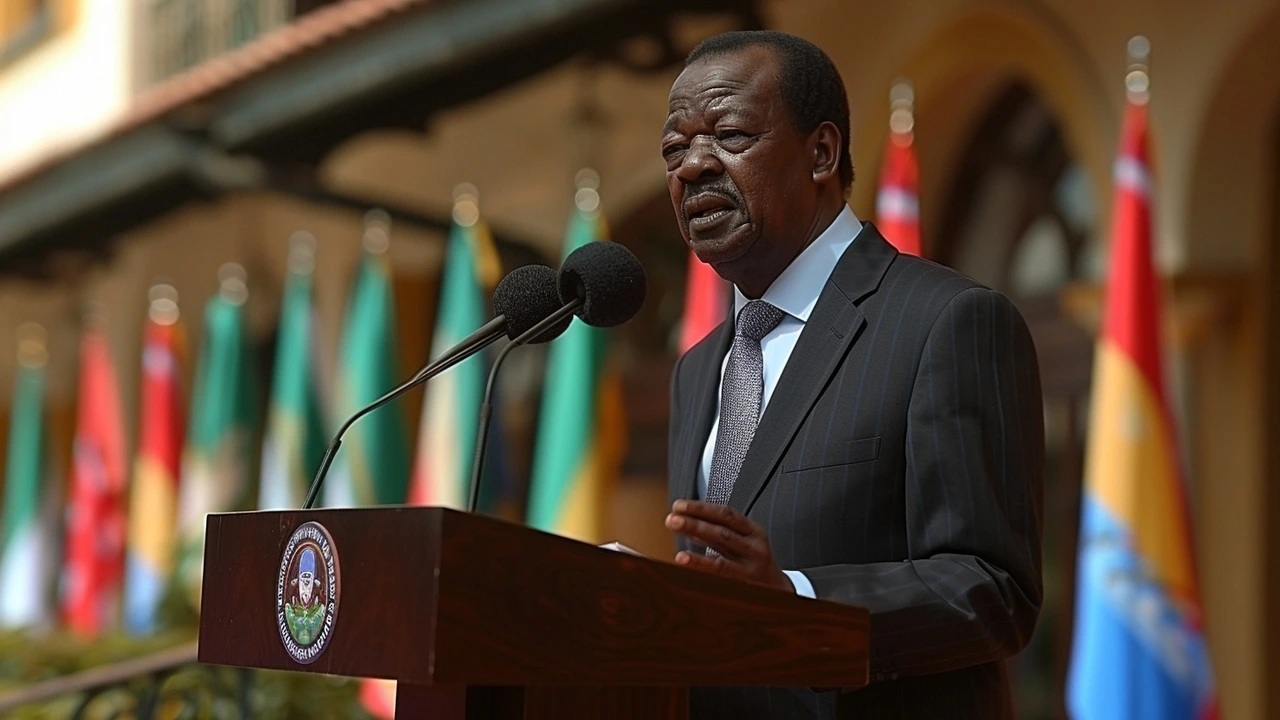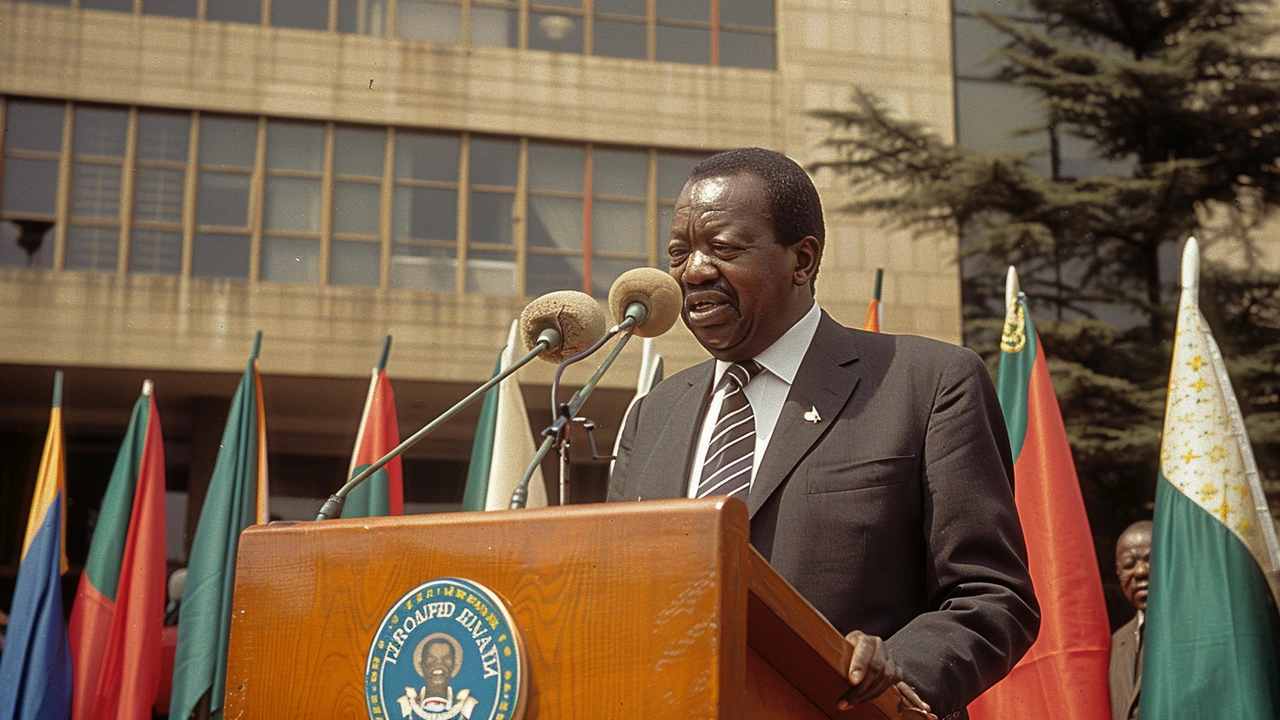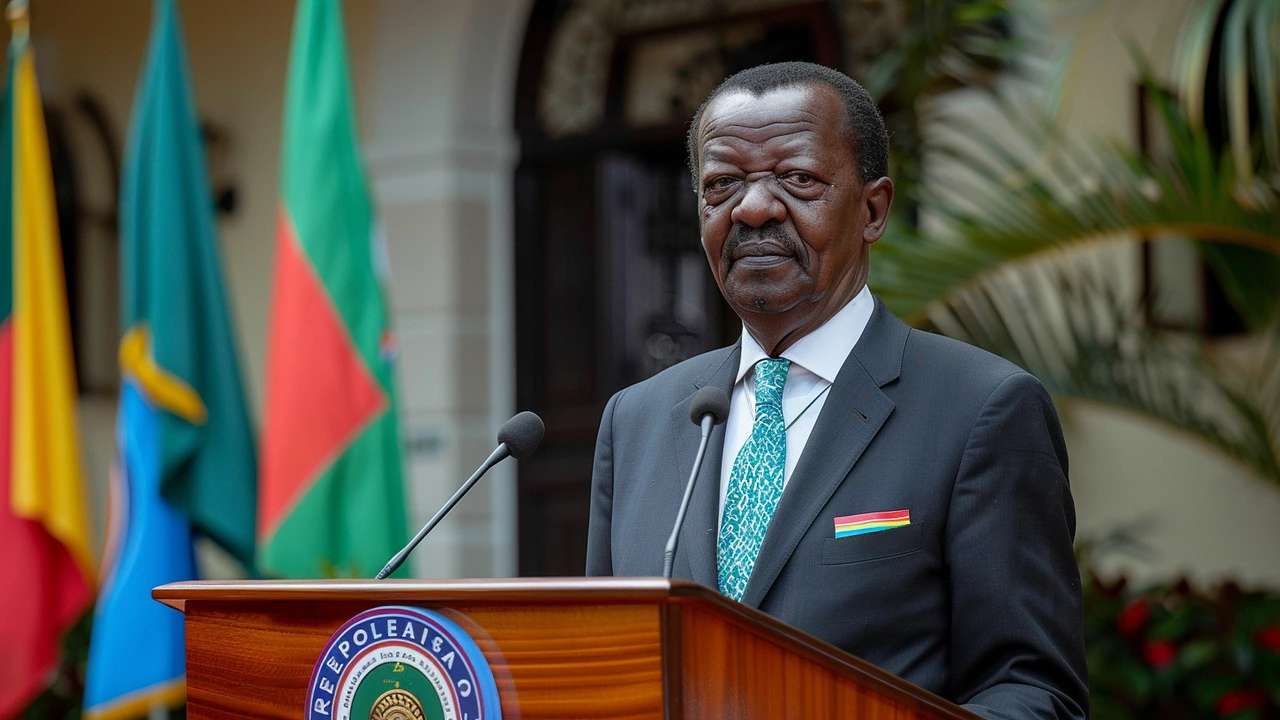Kenya to Nominate Raila Odinga for Key African Union Position by End of June

Kenya's Strategic Nomination
In a move that underscores Kenya's ambition to enhance its influence across Africa and beyond, the nation is set to submit the candidature of former Prime Minister Raila Odinga for the prestigious role of Chairperson of the African Union Commission (AUC) by June 30, 2024. As confirmed by the Foreign Affairs Principal Secretary, Korir Sing'oei, the Kenyan administration is diligently finalizing all requisite paperwork to ensure a timely submission before the looming deadline.
Raila Odinga, who currently holds the significant post of African Union High Representative for Infrastructure Development, is widely recognized for his substantial experience in both regional and international politics. His leadership has been pivotal in various infrastructure initiatives across the continent, positioning him as a formidable candidate for the AUC Chairperson role. His candidacy is part of Kenya's broader strategy to assert a stronger presence in the African Union and to contribute more proactively to the organization's critical decisions and initiatives.

Raila Odinga's Diverse Political Journey
Raila Odinga's political career spans decades, marked by his unwavering commitment to democratic processes and development across Africa. Born in 1945, Odinga has weathered numerous political storms, demonstrating resilience and adaptability. His tenure as Prime Minister of Kenya, from 2008 to 2013, showcased his ability to navigate complex political landscapes and broker crucial national agreements, including the historic coalition government following the contentious 2007 elections.
Beyond national politics, Odinga has carved out a niche for himself on the international stage. As the AU High Representative for Infrastructure Development, he has championed numerous projects aimed at bridging the infrastructure gap in Africa. His efforts have facilitated enhanced connectivity and economic integration, which are vital for the continent’s growth and stability. His hands-on experience and in-depth understanding of Africa’s infrastructural needs render him a credible and strong candidate for the AUC leadership.
A Wider Context: The African Union Commission
The African Union Commission, headquartered in Addis Ababa, Ethiopia, is the executive branch of the African Union (AU). The Chairperson of the AUC holds a highly influential role, responsible for the implementation of AU decisions and overseeing the organization's day-to-day operations. The position demands a leader with a profound grasp of African politics, economic challenges, and transformative policies.
The election for the AUC Chairperson, slated for February 2025, is a significant event in African politics. It offers a platform for member states to steer the continent’s agenda on critical issues such as economic integration, conflict resolution, health, and education. The Chairperson’s decisions can potentially alter the trajectory of regional cooperation and development.
Kenya's Aspirations and Regional Dynamics
Nominating Raila Odinga is part of Kenya’s strategic efforts to gain a more prominent role within the AU. By endorsing a candidate with Odinga's stature and international recognition, Kenya aims to elevate its diplomatic influence and reinforce its commitment to the African agenda. This move also signals Kenya’s intent to play a more central role in addressing the continent's pressing issues, from political stability and security to economic development and infrastructure.
Kenya's submission of Odinga's candidature aligns with its broader foreign policy objectives, which include enhancing economic ties within the East African Community (EAC) and beyond, and fostering regional stability. By advocating for a leader with comprehensive knowledge and experience, Kenya positions itself as a key player in shaping the future of Africa.

The Road Ahead
As the deadline for candidature submissions approaches, the spotlight will increasingly be on Raila Odinga and other contenders for the AUC Chairperson role. While Odinga’s extensive political experience and current role give him a significant advantage, the selection process remains highly competitive. The elected Chairperson will need to navigate a myriad of challenges, from political conflicts and economic downturns to public health crises and educational reforms.
In this context, Odinga's track record as a mediator and advocate for infrastructure development could prove pivotal. His leadership style, marked by pragmatism and inclusivity, may resonate with member states seeking a dependable and visionary figure to helm the African Union Commission.
As we approach the critical months ahead, Odinga’s nomination will undoubtedly catalyze discussions not only about his suitability but also about Kenya’s role in African politics. The outcome of this election will be a defining moment, potentially shaping the continent's strategic direction for years to come.
For the Kenyan government, the nomination of Raila Odinga is more than a tactical maneuver; it is a statement of intent, underlining the country's aspiration to contribute significantly to the collective African vision. As Raila Odinga embarks on this new journey, he carries with him the hopes and expectations of a nation looking to the future with optimism and determination.
Kenya’s decision to put forward Rail Raila Odinga reflects a measured ambition to deepen its diplomatic footprint across the continent. While the move is certainly bold, it respects the AU’s procedural timelines and offers a candidate with a proven track record in infrastructure development.
It is essential to recognize that Raila Odinga’s extensive experience aligns perfectly with the strategic demands of the AU Commission chairmanship. His prior role as High Representative for Infrastructure demonstrates both technical competence and political acumen, making his nomination a logically sound choice.
Honestly, this nomination is a real game‑changer – Odinga’s vibe on the continent is like a fresh breeze brething new hope, even if some naysayers try to rain on his candiate parade. The whole deal feels like a bold dance on the stage of African unity.
Great to see Kenya backing a leader who has spent decades building bridges-both literal and political-across Africa. This could usher in a new era of collaborative projects and shared prosperity for the whole region.
One could argue that the true test of leadership lies not in titles but in the capacity to listen to the silent voices of the continent a notion often ignored by conventional power structures
Let’s be clear: this is just another power play by Kenyan elites trying to thicken their own pockets while pretending to serve the continent. The AU has become a theater for corruption and backroom deals, and any nominee from a country with a checkered human‑rights record should be met with suspicion. Wake up, people, the narrative of progress is a smokescreen for self‑interest.
Sure, Odinga looks good on paper but remember the last time a “big name” turned things upside down – the whole system got messy and nobody really benefited. Maybe we should look at younger, fresher faces instead of re‑hashing the same old political playlist.
When we examine the broader implications of Kenya’s nomination, several layers of strategic thinking emerge. First, Raila Odinga’s long‑standing involvement in continental infrastructure projects positions him as a technocrat who understands both the macro‑economic and micro‑developmental challenges facing Africa. Second, his political resilience, demonstrated through decades of navigating Kenya’s turbulent electoral landscape, suggests an ability to mediate disputes among member states. Third, the timing of the nomination-just before the AU’s deadline-signals a coordinated diplomatic effort that could reshape voting alliances within the Union. Fourth, the African Union has long struggled with balancing representation from East, West, North, and Southern Africa; placing an East African at the helm could tip the scales toward more integrated regional policies. Fifth, Odinga’s reputation as a consensus builder may help ease lingering tensions in areas such as the Great Lakes region. Sixth, his background in infrastructure dovetails with the AU’s Agenda 2063, which emphasizes connectivity and trade. Seventh, the Kenyan government’s proactive stance could inspire other nations to nominate candidates with solid policy credentials rather than purely political patronage. Eighth, a successful bid would likely boost Kenya’s soft power, enhancing its ability to attract investment and development aid. Ninth, the internal dynamics within the AU Commission could shift, with potential reforms to increase transparency under Odinga’s leadership. Tenth, member states that have previously been skeptical about Kenya’s motives might reassess their positions in light of a proven track record. Eleventh, the nomination also raises questions about succession planning within the AU, prompting discussions on term limits and leadership renewal. Twelfth, the media narrative surrounding the bid will inevitably influence public perception across the continent. Thirteenth, civil society groups will likely monitor the process closely, demanding accountability and inclusive governance. Fourteenth, the eventual outcome-whether Odinga is elected or not-will have lasting repercussions for regional diplomacy. Finally, whatever the result, this episode underscores the evolving nature of African leadership and the importance of strategic, well‑qualified candidates in guiding the Union toward its collective aspirations.
Odinga’s infrastructure expertise could truly benefit the AU’s connectivity agenda.
It’s inspiring to see a candidate who blends experience with a genuine commitment to African unity; let’s hope this momentum carries forward into tangible projects that uplift communities across the continent.
i think the whole thing is a chance 4 the AU to show it can pick leaders based on skillz not just politikal games we all want a smoother collab.
Behind the glossy press releases lies a secret agenda: powerful multinational corporations stand to gain billions from the infrastructure contracts Odinga will hand out, and the AU’s very sovereignty could be sold piece by piece to the highest bidder.
Strategic alignment of geopolitical vectors necessitates a paradigm shift in institutional governance frameworks, leveraging stakeholder synergies to optimize macro‑level policy outcomes.
The nomination process must adhere to the AU’s established procedural guidelines, ensuring that all candidate submissions are verified for completeness and accuracy before the deadline.